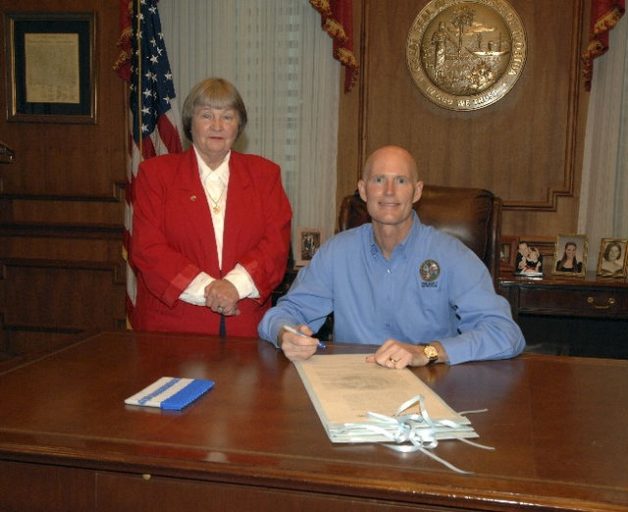There are a lot of ways to gauge the political significance of the gun bill signed by Florida Governor Rick Scott on Friday afternoon. But one number keeps jumping out to us.
Sixty-seven.
According to our analysis, that’s how many Republicans with A ratings from the NRA voted for the package, which includes measures — raising the minimum age for rifle ownership, imposing a waiting period on all gun purchases, delaying sales until background checks are completed — that the NRA vehemently opposes. (We pulled together a spreadsheet that breaks down votes for and against the bill by the lawmaker’s NRA letter grade.)
It’s those A-rated Republicans who enabled the bill to decisively overcome the objections of Democrats opposed to the provision that allows select staffers to be armed on school grounds, as well as exclusion of more sweeping reforms, such as universal background checks or a ban on assault-style rifles. In the state Senate, only six of 23 Republicans voted against the bill, and only three of 15 Democrats were in favor. In the House, the breakdown was 57 Republicans in favor, and 19 against, and 10 Democratic yes votes, versus 31 nos.
That’s a lot of daylight between Republicans and the NRA in a state where few GOP officials have dared defy the gun group.
Or, here’s the political significance of the bill, as reflected in a single image:

That’s Scott, up till now a staunch NRA ally/beneficiary, putting his signature on Florida’s unconstitutional “Docs vs. Glocks” law. Over his shoulder stands Marion Hammer, the NRA’s fearsome Florida lobbyist, who engineered the legislation. Emails obtained by Trace staff writer Mike Spies — which we’ve just posted in full — show that Hammer was formerly so cozy with the governor’s office that she told staffers which photographer to use to capture this moment.
Scott courted the NRA when the businessman turned politician first ran for governor in 2010. Now weighing a run for Senate, he seems to have decided he doesn’t need the group anymore. The feeling appears to be mutual: Scott was yanked from a slate of speakers listed for the NRA’s upcoming annual meeting in May.
Revenge against politicians who step out of line has been a key part of Hammer’s m.o. But the Republican revolt that pushed through the post-Parkland gun bill will test the limits of that tactic. Consider:
- The bill was carried through the legislature by Republicans who will be the next state House Speaker and Senate President, respectively. Observers think that wasn’t by accident, since chamber leadership has a lot of sway over the fate of rank and file members bills and careers.
- 67 defiant Republicans is a lot of incumbents to recruit primary challengers to run against before the June 22 filing deadline. You can only punish so many politicians at one time! Jared Moskowitz, the Democratic state rep whose district includes Parkland, summarized Republicans’ thinking to us this way: “We all jump off the cliff together.”
So, what’s next? Moskowitz, again:
“Republicans have been told that Marion has already asked the NRA to increase her budget. This is hand to hand combat. Some Republicans have received phone calls from NRA board members. The NRA is going to exact punishment on certain members. Something is going to happen. If there is no punishment, we’ll continue to roll them.”
Our take: He has it half right.
If enough Republicans walk away from this realizing they can vote against the NRA without reprisals, that may provide an opening for future bills. More likely, it could leave more Republicans free to vote against campus carry, open carry, or other envelope-pushing items on the NRA’s agenda.
On the other hand, if Republicans believe they’ve done enough to satisfy voters, they are not going to put forward new gun regulations on their own.
“We’re going to come back next legislative session and, when we start asking about gun control, the Republican response is going to be, ‘Gun control? What?’”Representative Carlos Guillermo Smith, one of the many Democrats who voted against the bill, told us.
“I don’t have any expectation that they’re going to start taking gun safety seriously,” He said. “That’s why they crammed this bill down our throats.”
Smith notes that all 37 of the amendments put forward by Democrats were rejected. He says his party members wanted to see the legislative session extended so that lawmakers could hash out a more comprehensive, bipartisan bill. “We extend the session all the time for less important issues. We had a special session last year over medical cannabis.”
Bottom line: We haven’t seen a Republican-controlled state rally to pass significant gun restrictions after a mass shooting. Not after Charleston in 2015, not after Las Vegas last October — not, for that matter, after Orlando in 2016.
But for this to be the first step toward more gun regulation in Florida, rather than a one-time gesture, the #NeverAgain movement will have to pressure Republicans into believing that what they’ve just passed was a first step, not a final fix.
Mike Spies and Alex Yablon contributed reporting.


